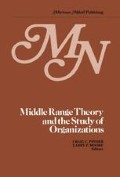Abstract
Middle range theorizing has been proposed as an efficient means by which sets of hypotheses can be integrated and synthesized into submolar theory, such that the hypotheses are grounded in empirical confirmation while lending themselves to a higher-order theoretical abstraction. This approach can be construed as an epistomological strategy of moderation or middle ground, on a continuum of abstraction above organized descriptive data but beneath comprehensive theories that attempt to explain large-scale social phenomena. According to Merton (1967), middle range theories consist of limited sets of assumptions from which specific hypotheses are logically derived and confirmed by empirical investigation. Advocates of middle range theories (Merton, 1967; Weick, 1974) have outlined three particular characteristics of these theories that are of special concern to this paper. First, middle range theory involves abstractions, but these abstractions are close enough to observed data to be incorporated in propositions that permit empirical testing. Secondly, a given theory of the middle range having a measure of empirical confirmation can often be subsumed under comprehensive theories, which are themselves discrepant in certain respects. Thirdly, an effective strategy of scientific inquiry is to develop theories of the middle range and consolidate them periodically. The focus of this paper is on the applicability of middle range theorizing to the construct of organizational effectiveness, a construct that has met with limited success when conceptualized via traditional modes of analysis, and accordingly may be more profitably studied through the use of middle range theories.
Access this chapter
Tax calculation will be finalised at checkout
Purchases are for personal use only
Preview
Unable to display preview. Download preview PDF.
References
Bennis, W.G. Toward a “truly” scientific management: The concept of organizational health. General Systems Yearbook, 1962, 7, 269–282.
Bierstedt, R. Sociology and humane learning. American Sociological Review, 1960, 25, 3–9.
Campbell, J.P. Contributions research can make in understanding organizational effectiveness. In S. Spray (Ed.), Organizational Effectiveness: Theory, Research, and Application. Kent, Ohio: Kent State University Press, 1976, 29–45.
Campbell, J.P. On the nature of organizational effectiveness. In P.S. Goodman and J.M. Pennings (Eds.), New Perspectives on Organizational Effectiveness. San Francisco: Jossey-Bass, 1977, 13–55.
Caplow, T. Principles of Organization. New York: Harcourt, Brace, and World, 1964.
Child, J. Managerial and organizational factors associated with company performance—Part 1. Journal of Management Studies, 1974, 11, 175–189.
Dubin, R. Organizational effectiveness: Some dilemmas of perspective. In S. Spray (Ed.), Organizational Effectiveness: Theory, Research, and Application. Kent, Ohio: Kent State University Press, 1976, 7–14.
Friedlander, F., and Pickle, H. Components of effectiveness in small organizations. Administration Science Quarterly, 1968, 13, 289–304.
Georgopoulos, B.S., and Tannenbaum, A.S. The study of organizational effectiveness. American Sociology Review, 1957, 22, 534–540.
Ghorpade, J. (Ed.). Assessment of Organizational Effectiveness. Pacific Palisades, California: Goodyear, 1971.
Goodman, P.S., and Pennings, J.M. (Eds.). New Perspectives on Organizational Effectiveness. San Francisco: Jossey-Bass, 1977.
Hall, R.H. Organizations: Structure and Process. Englewood Cliffs, N.J.: Prentice–Hall, 1972.
Hall, R.H., and Clark, J. P. Organizational effectiveness: Some conceptual, methodological and moral issues. Paper presented at the American Sociological Association Meetings, 1977.
Hannan, M.T., and Freeman, J. Obstacles to comparative studies. In P.S. Goodman and J.M. Pennings (Eds.), New Perspectives on Organizational Effectiveness. San Francisco: Jossey-Bass, 1977, 106–131.
Katz, D., and Kahn, R.L. The Social Psychology of Organizations. New York: John Wiley, 1966.
Marx, M.H., and Hillix, W.A. Systems and Theories in Psychology. New York: McGraw-Hill, 1963.
Merton, R.K. On Theoretical Sociology. New York: The Free Press, 1967.
Molnar, J. J., and Rogers, D.C. Organizational effectiveness: An empirical comparison of the goal and system resource approaches. Sociological Quarterly, 1976, 17, 401–413.
Pfeffer, J. Usefulness of the concept. In P.S. Goodman and J.M. Pennings (Eds.), New Perspectives on Organizational Effectiveness. San Francisco: Jossey-Bass, 1977, 132–145.
Price, J.L. The study of organizational effectiveness. Sociological Quarterly, 1912, 13, 3–15.
Schein, E.A. Organizational Psychology. Englewood Cliffs, N.J.: Prentice-Hall, 1970.
Spray, S.L. (Ed.). Organizational Effectiveness: Theory, Research, and Application. Kent, Ohio: Kent State University Press, 1976.
Steers, R.M. Problems in the measurement of organizational effectiveness. Administrative Science Quarterly, 1975, 20, 546–558.
Weick, K.E. Middle range theories of social systems. Behavioral Science, 1974, 19, 357–367.
Yuchtman, E., and Seashore, S.E. A system resource approach to organizational effectiveness. American Sociological Review, 1961, 32, 891–903.
Author information
Authors and Affiliations
Editor information
Editors and Affiliations
Rights and permissions
Copyright information
© 1980 Martinus Nijhoff Publishing
About this chapter
Cite this chapter
Muchinsky, P.M., Morrow, P.C. (1980). The Applicability of Middle Range Theories to the Study of Organizational Effectiveness. In: Pinder, C.C., Moore, L.F. (eds) Middle Range Theory and the Study of Organizations. Springer, Dordrecht. https://doi.org/10.1007/978-94-009-8733-3_25
Download citation
DOI: https://doi.org/10.1007/978-94-009-8733-3_25
Publisher Name: Springer, Dordrecht
Print ISBN: 978-94-009-8735-7
Online ISBN: 978-94-009-8733-3
eBook Packages: Springer Book Archive

